DAMASCUS, Syria -- Germany revived calls Wednesday for a no-fly zone in northern Syria to protect civilians from bombardment from Russia's air campaign supporting President Bashar Assad's forces.
The proposal came during international efforts to produce at least a temporary truce and as the government allowed humanitarian aid to head for besieged areas around the country, part of an effort described by a Russian official as a first step toward implementation of an agreement reached among world powers in Munich last week.
U.N. envoy Staffan de Mistura has been trying to secure aid deliveries and to improve the chances of restarting peace talks before the end of February. But those efforts have been clouded by a government offensive north of Aleppo, where various forces backed by regional and international rivals are clashing over a crucial strip of land linking Syria's largest city to the border with Turkey.
The violence in Aleppo, which has sent tens of thousands of people fleeing toward the border, led to the collapse of indirect talks between the Syrian government and its opponents earlier this month.
A long-standing proposal to establish a no-fly zone in northern Syria has been floated repeatedly by Turkey and other Assad opponents throughout the 5-year-old war.
Those pushing for a no-fly zone want to create a haven for tens of thousands of displaced Syrians and help stem the flow of refugees to Europe. But the U.S. has long rejected the idea, fearing it would draw U.S. ground forces into the civil war.
German Chancellor Angela Merkel expressed support Tuesday for the idea and repeated it Wednesday in Parliament. She said it could be done by an agreement with Assad, his backers and the coalition fighting the Islamic State extremist group.
At a news conference, Merkel said such an agreement would be "a sign of goodwill," suggesting she was referring to a more informal deal to halt aerial attacks, and that this could help lead to the overall cessation of hostilities agreed upon in Munich.
Enforcing a no-fly zone has become considerably more difficult since Russia began its air campaign in Syria on Sept. 30. Russia's Deputy Foreign Minister Gennady Gatilov shrugged off Merkel's proposal, saying it would require Damascus' consent and approval from the United Nations Security Council.
Asked by reporters about Merkel's initiative, Russian Foreign Minister Sergey Lavrov responded: "It's not Merkel's initiative. It's Turkey's initiative."
A U.S.-led bombing campaign helped oust Libyan dictator Moammar Gadhafi in 2011, but that came with a resolution from the U.N. Security Council and agreement among NATO's 28 members. Such a scenario is almost unlikely in Syria. Russia has made clear that it won't sign off on any such mission and has exercised its veto to block all efforts at the Security Council to sanction Syria, a close ally in the Middle East.
Turkish President Recep Tayyip Erdogan criticized the U.S. for not backing his country's proposals, adding that a no-fly zone would have prevented Russia's air campaign in the region and saved the lives of thousands of civilians.
"Oh, America, you did not say 'yes' to 'no-fly zone.' Now the Russian planes are running wild over there, and thousands and tens of thousands of victims are dying," Erdogan said. "Weren't we coalition forces? Weren't we to act together?"
The U.S., Russia and other world powers agreed Friday on a deal calling for a halt to hostilities within a week, the delivery of urgently needed aid to besieged areas of Syria and a return to peace talks in Geneva.
Gatilov said "the implementation of the Munich agreements on [the] Syrian settlement has started."
A U.N.-facilitated aid operation was going ahead, a development that U.N. spokesman Stephane Dujarric said in New York was "an incredibly important first step."
More than 100 trucks delivering food, medicine and other assistance reached the rebel-held towns of Madaya and Zabadani, northwest of the capital, while a 35-truck convoy was to deliver aid to the rebel-held suburb of Moadamiyeh southwest of Damascus.
According to the agreement, aid would be delivered simultaneously to two communities in the northern province of Idlib that are under siege by rebels.
"Today, we reached five besieged towns in urgent need of humanitarian assistance," said Yacoub el-Hillo, the U.N.'s humanitarian coordinator in Syria.
The aid was expected to reach more than 100,000 people, said Dujarric, spokesman for U.N. Secretary-General Ban Ki-moon.
The U.N. chief, however, warned that military activity in Syria and threats of further use of force risk derailing efforts to reconvene peace talks.
Ban said in a letter to the Security Council obtained Wednesday that rarely have the international community and the council been presented with such a stark choice: Implement a resolution adopted in December endorsing a peace process for Syria or watch the warring parties pursue "the bankrupt logic of a military victory."
Ban said the United Nations will do all it can to pursue peace, but it needs international support to be successful.
Information for this article was contributed by Vladimir Isachenkov, Edith M. Lederer and David Rising of The Associated Press.
A Section on 02/18/2016



